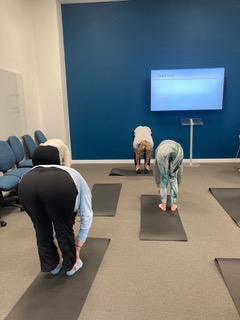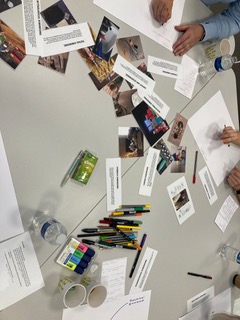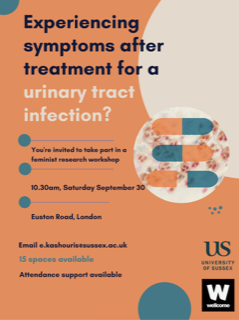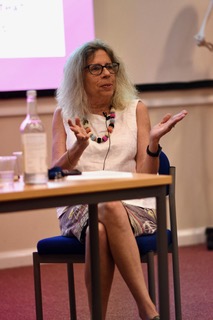Our Outputs
Dr Kashouris hosted the first event for people experiencing Urinary Tract Infections, ‘A feminist research workshop for people experiencing symptoms after treatment for a urinary tract infection’ in Newcastle. Another is planned for London on 30th September 2023 at the Friends’ Meeting House in London.



Professor Farsides won a University of Sussex Academic Impact Champion Award, having been nominated by Dr McKnight and Dr Kashouris. The title of the award was, ‘Going above and beyond during the pandemic: enabling research and supporting early research at Sussex’. The money will be used to run an event celebrating Professor Farsides’ contribution to our project and to others.

Marginalisation and the Microbe
Download the conference schedule: Marginalisation and the Microbe 23/24 November.
Location: Medical Teaching Building on the University of Sussex campus. Room 307B for the 22nd (1 – 6pm) and room 208/209 for the 23rd from 9:30am-1pm.
Podcasts, blogs, editorials, and letters
In November 2019 Dr Catherine Will contributed a podcast to the AMR Studio series at the University of Uppsala on 'Reframing Resistance'.
Eleanor Kashouris blogged on health inequalities in the BSA blog, Discover Society 2020, in a piece 'On the Frontline: redeveloping Southall and a story of soil, gas, empire and resistance' Discover Society, and since wrote on ‘Antibiotics: Handle with Care’ in the Cost of Living blog 2020.
Dr Catherine Will (2020) “‘And breathe…’? The sociology of health and illness in COVID-19 time” on Sociology of Health and Illness 42:5:967-71 https://onlinelibrary.wiley.com/doi/10.1111/1467-9566.13110.
Dr Catherine Will and Professor Gillian Bendelow (2020) ‘Processing the Pandemic’ Sociology of Health and Illness 42:8:e1-3 https://onlinelibrary.wiley.com/doi/10.1111/1467-9566.13222.
Dr Catherine Will and Dr Ulla McKnight (2022) wrote about Catherine’s illness in ‘Cancer during COVID’ published on the Cost of Living blog in April 2022.
Papers and other peer reviewed pieces
Will, C. (2020) The Problem and The Productivity of Ignorance: public health campaigns on antibiotic stewardship. The Sociological Review 68:1:55-76. https://journals.sagepub.com/doi/full/10.1177/0038026119887330. This paper offers a critical account of efforts to engage people with the issue of antimicrobial resistance. It analyses how public health workers encourage what they understand as responsible antibiotic use or antibiotic stewardship, and how their efforts are shaped by different theories of ‘behaviour’ or social action. Discourse analysis of all major UK campaigns and their evaluations over the last two decades reveals how different versions of the citizen jostle for attention in a public health that draws on sociology, psychology, and increasingly behavioural economics. Rejecting an explanation which focuses solely on the appeal of emotion in new forms of governance, I deploy theories of expert and lay ignorance to show how public health is pushed towards new approaches as it struggles with an apparently recalcitrant public in the case of AMR. Here ignorance is both problematic and productive, prompting a shift to campaigns based on unreflective action, that are accompanied by decisions to work with potential misunderstandings about antibiotics and their effects. The paper proposes the term ‘shrug’ as a provocative counterpart to the ‘nudge’ of behavioural economics, drawing attention to the ways in which behavioural interventions may be linked to strategic retreats from engagement, when policy makers feel unable to affect or predict the understanding and views of non-experts. It thus contributes to sociological and political critique of narrow forms of behavioural thinking and their effects on relations between governments and their citizens.
Will C and Kamenshchikova A. (2020) From universal frames to collective experimentation? Pursuing serious conversations about antimicrobial resistance (version 1; peer review: 2 approved). Wellcome Open Research 5:192 https://doi.org/10.12688/wellcomeopenres.16135.1. In the time of coronavirus disease 2019 (COVID-19) there are numerous attempts to compare across national boundaries and rank governments for their action against the virus. In this context the ‘universal’ ambition of the Wellcome Trust report on communicating antimicrobial resistance (AMR) is somewhat refreshing and recalls some of the older ambition of the global health field. Though the report now feels some time ago – it was published in November 2019 - the pandemic does not mean AMR has gone away. Indeed, it may be worsened in the context of rescue prescribing, both for secondary infections following COVID-19 and other health conditions where antibiotics may stand in for scarce or compromised care. In this open letter we wish to respond to the Trust report – locating it in the field of social science work on AMR – and proposing some directions for further discussion. In particular, writing against the backdrop of the viral pandemic, we explore how both COVID-19 and AMR raise questions about our attachment to modern medicine, about the motivating value appeals to vulnerability and health inequality. We therefore call for the report and others to be the start of the further long-distance conversations and experimentation across different fields. This was a response to the Wellcome Trust report 'Reframing Resistance. How to communicate about antimicrobial resistance effectively'.
In October 2021 Dr Mark Erickson and Dr Catherine Will published a chapter entitled: ‘Scenes from the many lives of Escherichia coli: A play in three acts’ in a book called ‘With Microbes’ edited by Charlotte Brives, Matthäus Rest and Salla Sariola and published by Mattering Press.
Dr Ulla McKnight (2021) Replacement feeding and the HIV diaspora: a case of ontological multiplicities and fluid technologies in Sociology of Health and Illness 44:169-187 https://onlinelibrary.wiley.com/doi/epdf/10.1111/1467-9566.13405. This article draws on a doctoral project that involved a nine- month long ethnographic investigation into a once- weekly HIV specialist antenatal clinic housed within an acute National Health Services hospital in London. The hospital is home to one of England's busiest HIV centres. The article explores the ontological multiple HIVs that the practice of replacement feeding takes part in enacting within the fluid space of the HIV diaspora. The term articulates the circumstances of racialised people affected by HIV who are originally from countries where access to life sustaining medication, care and resources— that enable a decoupling of the ill-ness from death— are not readily accessible, and who have (temporarily) relocated themselves to geographical places where these resources are on offer. Arguing that Black African and Caribbean migrant women's ability to benefit from the technologies and care that have turned HIV into a chronic illness in England is de-limited by race and their diasporic positionality. In so doing, the article contributes to Sociology by showing how race is part of practice– ethnographic research and medical care even when it is seemingly absent.
In November 2023, we premiered our ‘play’ "Scenes from the many lives of Escherichia coli" composed by Professor Catherine Will, Dr Mark Erickson and Joe Davin.


